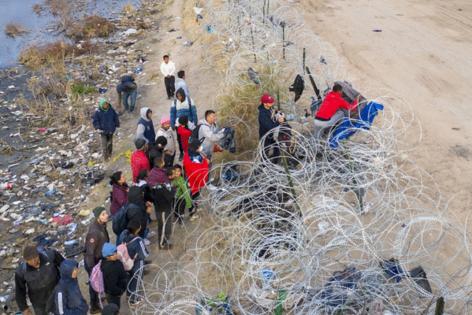Commentary: Republicans' new border target: migrant aid groups
Published in Op Eds
Right-wing border-bashing is reaching a fever pitch. Conservative politicians and media outlets have gone beyond condemning all migrants and refugees as criminals and invaders. They’re now accusing even migrant aid organizations of working with cartels to facilitate sex trafficking and drug smuggling.
On Jan. 17, right-wing activist James O’Keefe posted a video he filmed of a migrant shelter operated by Casa Alitas in Tucson, Arizona, which he claimed was a “secret” facility that “none of the American people knew about until now.” After Elon Musk commented on it twice, the video was viewed nearly 3 million times on X.
On Feb. 14, Rep. Tom Tiffany, R-Wis., tried to gain access to the Casa Alitas shelter. Employees had to call 911 to have him removed from the property. Tiffany then accused Casa Alitas and the humanitarian aid group Tucson Samaritans of “aiding illegals” and called for them to be investigated by Congress and the Department of Justice. A Fox News crew was also subsequently turned away from what it called a “secret hotel” where migrants were housed by Casa Alitas.
On Feb. 20, Texas Attorney General Ken Paxton sued El Paso-based migrant shelter Annunciation House for refusing to turn over documents relating to its operations. Paxton accused the shelter of “astonishing horrors,” including “facilitating illegal entry to the United States, alien harboring, human smuggling, and operating a stash house.” While a Texas judge has since ruled in favor of Annunciation House, shelter director Ruben Garcia said the suit has caused some volunteers to quit out of fear they could be targeted by the government.
Volunteers and staff at Casa Alitas in Tucson fear for their safety as well, and security at the shelter has been increased, according to Pima County Supervisor Adelita Grijalva. Migrant aid workers who help people in the desert and at the border fence say they also have been subject to increasing threats from armed, anti-immigrant vigilantes.
“What’s frightening about them [vigilantes] is they carry guns; we carry water,” Gail Kocourek, a volunteer with the Tucson Samaritans, told Tucson.com.
“These kinds of attacks should alarm all of us,” Tucson-based immigration attorney and human rights activist Isabel Garcia said at a panel discussion at the University of Arizona on Feb. 27. “Catholic Social Services [which operates Casa Alitas] is not a radical group.”
Adding to the concern, federal funding for Casa Alitas is facing a 20% budget cut under the just-approved congressional budget deal. Casa Alitas Director Diego Piña Lopez says the cut will result in a reduction of staff and services and that street releases of migrants, which are already happening in San Diego and other cities, are expected to begin in Tucson in April.
Arizona Sens. Mark Kelly and Kyrsten Sinema, among other state politicians and community leaders, are calling for additional shelter funding. They contend that helping migrants get access to food, shelter, medical care and transportation is a federal responsibility and a matter of public health and safety — not to mention human decency — that will save money and benefit society in the long run.
Advocates are demanding a stronger defense of vulnerable migrant populations. Garcia has co-founded an organization called Stop the Hate Collective to focus on this issue.
Arizona business and political leaders are also pushing for increased staffing and improved technology at the ports of entry. They say this would allow inspectors to stop more fentanyl from entering the country, most of which is smuggled in through the ports. It would also help stop the smuggling of guns into Mexico, a major source of violence south of the border that’s causing people to flee to the United States.
Demonizing migrants, building taller walls and putting up dangerous razor wire, calling for unrealistic mass deportations, busing migrants to cities unprepared to meet them or forcing them to remain in Mexico in unsafe circumstances — 38 died in a migrant shelter fire in Ciudad Juarez last March, while in recent years thousands have been kidnapped, raped, murdered, drowned or died in the desert — will not make America safer.
The only way to make America safer is to provide enough funding so migrants and refugees can be adequately vetted, cared for and resettled in communities that want and need their labor.
____
Miriam Davidson is a Tucson-based journalist and author of three books on U.S.-Mexico border issues, including the award-winning "The Beloved Border: Humanity and Hope in a Contested Land" (University of Arizona Press, 2021). This column was produced for Progressive Perspectives, a project of The Progressive magazine, and distributed by Tribune News Service.
___
©2024 Tribune Content Agency, LLC.







Comments